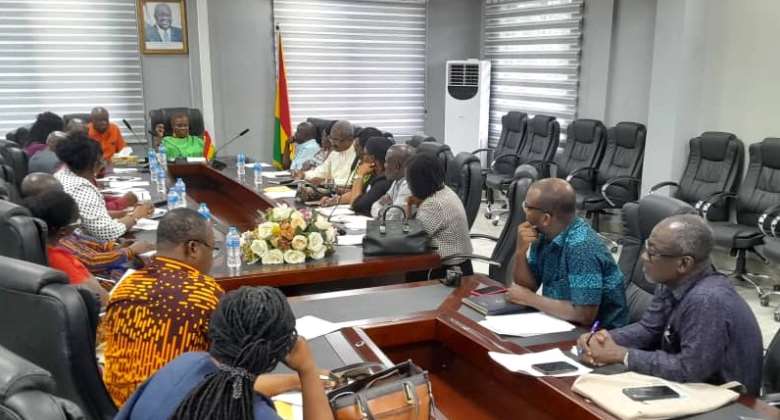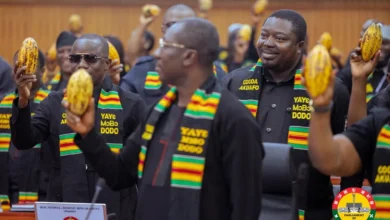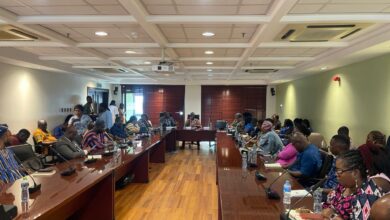CONIWAS meets Sanitation Minister over Ghana’s Presidential Compact for WASH
CONIWAS meets Sanitation Minister over Ghana’s Presidential Compact for WASH

In May 2023, in the Netherlands, Ghana was prominent among the 10 ministerial level delegations at the ‘All Systems Connect International Symposium’, which followed on the heels of the UN-Water conference, seeking to provide the ‘how’ to the UN Conference’s ‘why’; and focusing on systems leadership, connecting across sectors and taking action that will accelerate progress and deepen impact to achieve the Sustainable Development Goals (SDGs).
At the event, Ghana’s Minister for Sanitation and Water Resources (MSWR), Mrs. Cecilia Abena Dapaah delivered a powerful keynote address on ‘Strengthening all systems – building resilience with water, sanitation and hygiene.’
Mrs. Abena Dapaah in her address reaffirmed her Government’s intention to develop a Presidential Compact for WASH and enact legislation to establish a National Sanitation Authority (NSA) and transform the Community Water and Sanitation Agency.
According to the Sanitation Minister, Ghana aims to enhance private sector participation, increase financing, and create strong and resilient national systems for safe and sustainable WASH services.
Mrs. Abena Dapaah was of the view that strengthening water resource management and collaborating with other sectors like health, agriculture, and energy is crucial for achieving universal access to water and sanitation.
To this end, members of the Coalition of Non-Governmental Organisations (NGOs) in Water and Sanitation (CONIWAS) on Thursday, June 14, 2023, held a meeting with the Minister for Sanitation and Water Resources (MSWR), to find out the expected role of Civil Society Organisations (CSOs) and other strategic partners in the sector can play in supporting proposed Presidential Compact for WASH.
Members of the coalition used the opportunity to formally welcome the minister back from the international WASH conferences, briefly hear from her on the sector commitments and intentions expressed at the international event, and also discussed the intended implementation processes of the plans and commitments.
Addressing the Coalition members, the Sanitation and Water Resources Minister announced that her ministry was in the process to set up a committee to develop the compact and assured them that CONIWAS will be invited to join this working committee.
The ministry according to her will also receive support from the Sanitation and Water for All (SWA) Secretariat to support the initiative.
“Even though Ghana is doing well in terms of water delivery, sanitation is still a challenge. The ministry is looking to work with sector players to come out with realistic ways to bridge the sanitation gap. One of the ways currently being considered is to work with the private sector in the sanitation delivery chain to bridge the gap.
The water policy is completed, but yet to be sent to the cabinet. It is currently being reviewed by another key related ministry after which it will be sent to the cabinet for approval.” She hinted.
Mrs. Abena Dapaah however, reminded members of the coalition that there is still a ban on the setting up of any new government structures such as the NSA. This ban she explained is a result of the economic challenges that Ghana has been facing. However, the NSA is a priority for the government, so as soon as the ban is lifted, the NSA will be passed by the cabinet for its establishment.
Speaking in an interview with the media after the meeting, the Executive Secretary of CONIWAS, Mrs. Basilia Nanbigne, said her outfit is happy that the National Sanitation Authority (NSA) is one of the issues highlighted in the commitment. “And we are really looking forward to its establishment.” She added.
“We applaud the ministry for all the great work it has been doing. We know the Ministry is about to launch the Sustainable WASH Development Framework: the Ghana WASH Sector Development Programme. We are happy about this document and hope that it will guide all sector players in the development of our WASH plans and will contribute to overall sector performance.
We at the coalition also know the Community Water and Sanitation Agency (CWSA) reforms are ongoing, and we hope they will contribute to improving service delivery in the rural water sub-sector. Apart from the government and NGOs, we currently also have a private sector in the form of water enterprises providing water to communities, we hope the reforms will provide some form of regulatory role to provide sanity to the water sub-sector.”
She, however, called on the Ministry to consider promulgating “A Water Service Act” that will regulate all water service providers.




